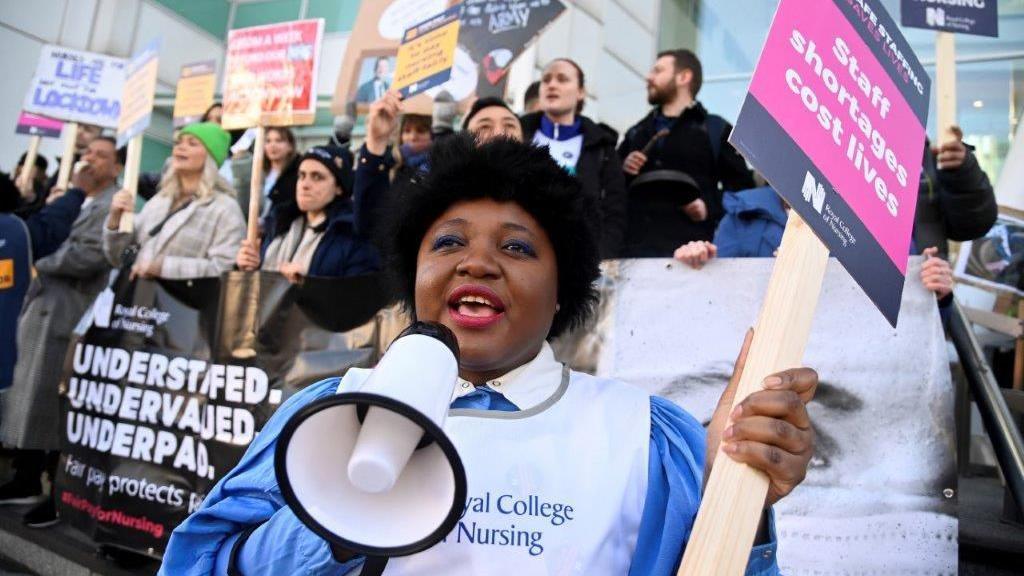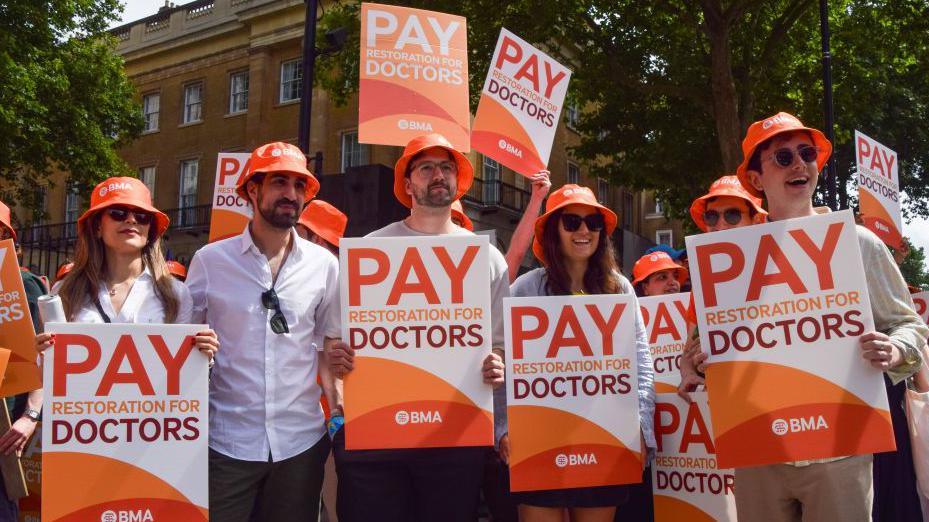Boost our pay or risk strike action, warn nurse leaders

A nurse on a picket line outside University College Hospital, London in 2023
- Published
Nursing leaders are warning the government in England must boost the pay of nurses or face possible strike action.
A survey of Royal College of Nursing members showed 91% did not think the 3.6% pay increase this year was enough. But, instead of seeking a bigger pay rise, the union wants ministers to reform the way the NHS contract works, warning too many nurses get stuck on the lowest pay bands which do not reflect their skills.
If the government does not act over the summer, the RCN is threatening to run an industrial action ballot in the autumn.
The government said it was disappointed nurses were not happy with the pay award, but it was willing to discuss wider reform of the contract.
More than 170,000 took part in the survey, more than half of the eligible membership.
It comes after resident doctors, the new name for junior doctors, took part in their 12th walkout of a long running pay dispute this week.
But following the end of that strike on Wednesday the British Medical Association and government agreed to restart talks - although these are expected to focus on improving working conditions as ministers say they will not negotiate on pay.
The RCN warned there was widespread dissatisfaction with the NHS contract, known as Agenda for Change.
Nurses begin on band five, with a starting salary of just over £31,000, after this year's pay rise.
Pay at the top of the band reaches nearly £38,000.
Nearly half of nurses are on this bottom band and research shows many struggle to move on from it.
The RCN has been calling for nurses to automatically move up to band six after working an initial preceptorship period, possibly 18-months.
Sources at the union said this could be one way to address the low pay.
'Deeply undervalued'
They said they were not targeting an increase to this year's pay because it was clear from the resident doctor dispute the government was not willing to revisit the pay awards which were recommended by an independent pay review process.
When the pay award was announced, the RCN called it "grotesque" as doctors were given more.
Members in Wales and Northern Ireland also said the 3.6% increase was not enough. In Scotland an 8% pay rise over two years has been agreed.
RCN general secretary Prof Nicola Ranger said: "My profession feels deeply undervalued and that is why record numbers are telling the government to wake up, sense the urgency here and do what's right by them and by patients.
"Record numbers have delivered this verdict on a broken system that holds back nursing pay and careers and hampers the NHS."
A Department of Health and Social Care spokeswoman said it was "disappointing" that RCN members were not happy with their pay rise, given it was above inflation.
But she said ministers were willing to enter discussions. "This government is clear we can't move any further on headline pay, but will work with the RCN to improve their major concerns, including pay structure reform, career progression and wider working conditions."
Last time the RCN ran a strike ballot, in 2023, turnout was too low to gain a mandate.
Get in touch
Are you a nurse with a view on strike action? Are you a patient affected by NHS strikes?
Related topics
- Published30 July
